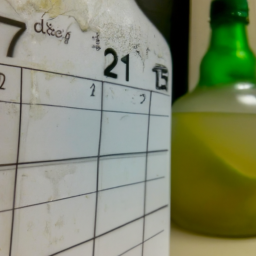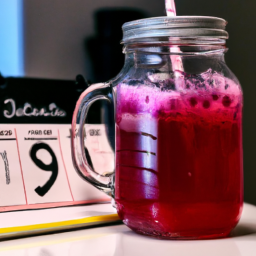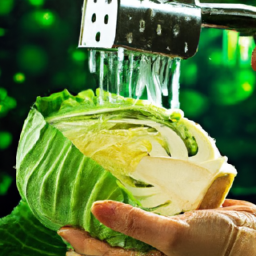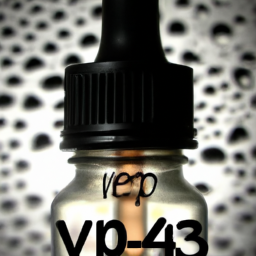As a fan of adding lime juice to my drinks and dishes, I often find myself keeping a bottle of lime juice in my pantry. However, I have also found myself wondering about the expiration date of this bottled lime juice and when it will go bad.
After doing some research, I’ve discovered that the shelf life of bottled lime juice can vary depending on several factors. One of the primary factors that can affect the shelf life of bottled lime juice is the type of bottle it’s stored in. Additionally, how the bottle is stored can also impact how long the lime juice will last.
In this article, I’ll dive into the details of bottled lime juice storage, including recommended storage times for different types of bottled lime juice and signs that the juice has gone bad. I’ll also share some tips for buying and using bottled lime juice to ensure that you get the most out of your purchase.
Key Takeaways
- Unopened bottled lime juice can last up to one year if stored properly.
- Once opened, juice should be consumed within a week or two.
- Signs of spoilt bottled lime juice: foul odor, discoloration, cloudiness, changes in taste.
- Expired lime juice can undergo changes in acidity, making it unsafe to consume.
Shelf life of bottled lime juice
You might be wondering how long your bottled lime juice will last, but the shelf life can vary depending on factors such as the expiration date, storage conditions, and whether or not it has been opened. Generally, unopened bottled lime juice can last for up to one year if stored properly.
However, once opened, the juice should be consumed within a week or two, as it can quickly lose its flavor and nutrients. To ensure the longest shelf life for your bottled lime juice, it’s best to store it in a cool, dry place away from direct sunlight.
Once opened, it should be refrigerated at all times. Additionally, make sure to check the expiration date before purchasing the bottle and only buy what you need to avoid waste. With proper storage tips, you can enjoy the full flavor and benefits of your bottled lime juice for as long as possible.
When it comes to storing lime juice, the type of bottle can also make a difference. Let’s take a look at the different options for storing your juice.
Types of bottles for storing lime juice
When using glass or plastic containers, it’s important to consider the pros and cons of each. Glass bottles are great for long term storage as they don’t react with the contents, meaning the flavor of the lime juice remains unchanged over time. However, they can be quite heavy and break easily if dropped.
On the other hand, plastic bottles are lightweight and less likely to break, but can react with the contents over time, affecting the flavor. Ultimately, the type of bottle you choose will depend on your personal preferences and storage needs.
When it comes to choosing the best brands for long term storage, there are a few options to consider. Glass bottles from trusted brands such as Ball, Anchor Hocking, and Bormioli Rocco are great choices for preserving the freshness of lime juice. For plastic bottles, brands like Nalgene and CamelBak are known for their durability and resistance to chemical reactions with the contents.
By choosing the right container, you can ensure that your bottled lime juice stays fresh and flavorful for as long as possible. Now, let’s talk about how to store it correctly.
How to store bottled lime juice
If you want your lime juice to stay fresh and flavorful, it’s important to follow some best practices when storing it. First, make sure to keep the bottle tightly sealed and stored in the refrigerator.
Lime juice, like all citrus juices, is highly susceptible to oxidation, which can cause it to lose its flavor and spoil quickly. By keeping the bottle tightly sealed and refrigerated, you can slow down the oxidation process and extend the shelf life of your lime juice.
Another common mistake people make when storing bottled lime juice is leaving it in direct sunlight or at room temperature for too long. Heat and light can also cause the juice to spoil more quickly, so it’s important to keep it in a cool, dark place.
If you find that you have leftover lime juice that you don’t want to go to waste, consider repurposing it in creative ways, such as using it in salad dressings, marinades, or cocktails. By following these best practices and avoiding common mistakes, you can ensure that your bottled lime juice stays fresh and flavorful for as long as possible.
When it comes to determining if your bottled lime juice has gone bad, there are a few signs to look out for. If the juice has become cloudy or has an off odor, it’s likely that it has spoiled and should be discarded. Additionally, if the juice has been stored for longer than its expiration date, it’s best to err on the side of caution and dispose of it.
By keeping an eye out for these warning signs, you can ensure that you always have fresh, flavorful lime juice on hand for all your culinary needs.
Signs that bottled lime juice has gone bad
Spotting signs of spoilt bottled lime juice is crucial to avoid using it in your cooking. Here are some of the telltale signs that your bottled lime juice has gone bad:
-
Foul odor: If you notice a rancid or off-putting smell, it’s a sign that the lime juice has gone bad and should be discarded.
-
Discoloration: Fresh lime juice is usually bright green or yellow, but when it spoils, it can turn brown or dark in color.
-
Cloudiness: If the lime juice appears cloudy or murky, it’s an indication that it has started to spoil.
-
Changes in taste: Spoilt lime juice can taste bitter, sour, or stale. Common substitutes like lemon juice or vinegar can be used to replace it in your recipes.
It’s important to note that expired lime juice can also undergo changes in acidity, making it unsafe to consume. To avoid any health risks, it’s best to discard the spoilt lime juice and use fresh ones instead.
In the next section, we’ll discuss the recommended storage times for different types of bottled lime juice to ensure its freshness and quality.
Recommended storage times for different types of bottled lime juice
When it comes to bottled lime juice, there are a few key factors to consider beyond just its expiration date. Two important considerations are whether the juice is concentrated or reconstituted, and whether it is organic or non-organic.
Concentrated lime juice is typically more potent and longer-lasting, while organic options may be preferred for their lack of pesticides and other chemicals.
Concentrated vs. reconstituted lime juice
You’ll want to know the difference between concentrated and reconstituted lime juice if you’re wondering how long bottled lime juice lasts. Concentrated lime juice is made by removing water from fresh lime juice, leaving behind a more potent and tart flavor. On the other hand, reconstituted lime juice is made by adding water back into concentrated lime juice to create a more diluted flavor.
Apart from taste, there are also nutritional differences between concentrated and reconstituted lime juice. Concentrated lime juice contains more vitamin C and fewer calories than reconstituted lime juice. However, reconstituted lime juice contains more water, which makes it more hydrating.
When using bottled lime juice in cocktails, marinades, and dressings, it’s important to consider these differences in taste and nutritional content to achieve the desired outcome.
As for organic vs. non-organic options, it’s important to choose a brand that uses high-quality ingredients. Some bottled lime juice brands may use lime concentrate that has been treated with chemical preservatives, so reading the label carefully can help ensure that you’re getting a safe and healthy product. Ultimately, whether you choose organic or non-organic bottled lime juice, the storage time will still depend on the type of lime juice you choose.
Organic vs. non-organic options
Choosing between organic and non-organic options for lime juice can be a matter of personal preference and budget.
Organic lime juice offers several benefits, such as being free from pesticides and synthetic fertilizers, ensuring that the product is pure and natural. However, one drawback of organic lime juice is its cost. It is often more expensive than non-organic options due to the higher cost of production and certification.
Non-organic options, on the other hand, can be more affordable, making them a more practical choice for those on a tight budget. But they may contain traces of harmful chemicals that can have adverse effects on health.
When it comes to expired lime juice, it is crucial to dispose of it properly to avoid harmful effects on the environment. One way to do this is by pouring the lime juice down the drain while running hot water. This helps to break down the acid in the juice and prevent it from causing damage to pipes or septic systems. Alternatively, one can dispose of expired lime juice by adding it to a compost bin or using it as a natural cleaning agent.
How to properly dispose of expired lime juice
Disposing of expired lime juice may feel wasteful, but it’s important for the safety of you and your loved ones. Proper disposal of expired lime juice involves following the guidelines set forth by your local waste management facility. Improper disposal of expired lime juice can have negative environmental impacts, such as polluting water sources and harming wildlife.
To properly dispose of expired lime juice, the first step is to check with your local waste management facility for specific guidelines. In general, expired lime juice should be poured down the drain with plenty of water to dilute it. It’s important to avoid pouring expired lime juice into storm drains or on the ground, as it can seep into soil and contaminate water sources. Additionally, expired lime juice should not be placed in the trash or recycling bin, as it can leak and cause problems for waste management facilities.
Now that we’ve covered proper disposal of expired lime juice, let’s explore alternative uses for this citrusy liquid.
Alternative uses for expired lime juice
So, I’ve got some leftover expired lime juice and I don’t want to waste it. Luckily, there are a variety of cooking and cleaning applications that can put it to good use.
From adding it to marinades and dressings, to using it as a natural cleaner in the kitchen, there are plenty of ways to get creative with this citrus juice.
Additionally, there are some unique recipes out there that call for small amounts of lime juice, so why not try incorporating it into a fun new dish?
Cooking and cleaning applications
When you’re cooking or cleaning, bottled lime juice is a convenient and flavorful option that can last for up to 2 years in the pantry. Here are some uses for lime juice and benefits of using bottled lime juice for cooking and cleaning:
-
Cooking: Use bottled lime juice to add tang and acidity to marinades, dressings, and sauces. It’s also a great addition to recipes for guacamole, ceviche, and salsa. Plus, the convenience of bottled lime juice means you don’t have to worry about squeezing fresh limes for every recipe.
-
Cleaning: Lime juice is a natural cleaner and disinfectant due to its acidic properties. Use it to remove hard water stains, clean surfaces, and freshen up your garbage disposal. Plus, the citrus scent of lime will leave your home smelling fresh and clean.
Now that you know some alternative uses for expired lime juice, let’s dive into creative recipes for using up leftover juice.
Creative recipes for using up leftover juice
Looking to add some zing to your meals or cocktails? Don’t let leftover lime juice go to waste – try out one of these creative and delicious recipes!
For a refreshing and creative cocktail, mix together leftover lime juice, tequila, and triple sec for a classic margarita. Not a fan of tequila? Swap it out for vodka and add some cranberry juice for a deliciously tart Cape Codder.
But lime juice isn’t just for cocktails – it also makes a great marinade for chicken or fish. Combine lime juice with olive oil, garlic, and your favorite herbs for a flavorful and healthy marinade.
And if you have a sweet tooth, try using leftover lime juice in baking. It adds a tangy and refreshing twist to classic desserts like key lime pie or sugar cookies.
Now that you know some creative ways to use up leftover lime juice, you may be wondering how long it will stay fresh. Don’t worry, we’ll cover that in the next section about frequently asked questions about bottled lime juice storage.
Frequently asked questions about bottled lime juice storage
You might be wondering how to store bottled lime juice, so here are some frequently asked questions about its storage.
First off, how can you tell if the bottled lime juice is fresh? Generally, the expiration date on the bottle is a good indicator of when the juice will no longer be fresh. However, if the bottle’s been opened, it should be used within a week or two. Also, if the juice has an off smell or taste, it’s likely gone bad and shouldn’t be consumed.
Another question is what are the best recipes for using bottled lime juice in cocktails? Bottled lime juice is a popular ingredient in many cocktails, including margaritas, mojitos, and daiquiris. It can also be used in marinades for meat or fish, and as a flavoring in salad dressings. The key is to use the juice in moderation, as it can easily overpower other flavors in a dish.
With proper storage and careful use, bottled lime juice can be a versatile ingredient in many recipes.
When it comes to buying and using bottled lime juice, there are a few tips to keep in mind.
Tips for buying and using bottled lime juice
To get the best flavor in your cocktails and dishes, it’s important to choose a high-quality bottled lime juice. When shopping for bottled lime juice, look for brands made with 100% lime juice and avoid those with added preservatives or artificial flavors. It’s also a good idea to check the expiration date to ensure freshness.
Using bottled lime juice can save time and effort in the kitchen, and it can also provide health benefits. Lime juice is a good source of vitamin C and antioxidants, which can help boost the immune system and protect against disease. Additionally, bottled lime juice can be used in creative recipes beyond just cocktails and dishes, such as marinades, dressings, and even desserts.
Just be sure to store the bottle properly and use it within a reasonable timeframe to ensure the best flavor and nutritional value.
Frequently Asked Questions
Can bottled lime juice be frozen for long-term storage?
Yes, bottled lime juice can be frozen for long-term storage using standard freezing methods. However, it may affect the taste and quality as compared to fresh lime juice.
Is it safe to consume bottled lime juice past its expiration date?
Consuming expired lime juice is like playing Russian roulette with your health. It may cause food poisoning and even lead to serious illness. Avoid using expired lime juice for cooking to prevent health risks.
Does exposure to light affect the shelf life of bottled lime juice?
Exposure to light can shorten the shelf life of bottled lime juice by increasing oxidation. Fresh lime juice is preferable due to its higher nutrient content and lack of preservatives.
Can you store bottled lime juice in a plastic container instead of glass?
Storing bottled lime juice in a plastic container is feasible, but it may not ensure the same shelf stability as glass. The acidity of lime juice can interact with the plastic, leading to changes in flavor and quality.
What is the difference between key lime juice and regular lime juice in terms of storage and shelf life?
Key lime juice and regular lime juice differ in taste and culinary uses. Key lime juice has a stronger flavor and is commonly used in desserts like key lime pie, while regular lime juice is used in a variety of dishes. In terms of storage and shelf life, both juices can be stored in the same way.
Conclusion
So, there you have it, folks. Bottled lime juice can last for quite some time if stored properly and in the right type of bottle. It’s important to keep an eye out for any signs of spoilage, such as discoloration or an off smell, and to dispose of expired lime juice properly.
Remember, when life gives you expired lime juice, make something else out of it! There are plenty of alternative uses for it, such as using it as a cleaning agent or adding it to homemade marinades and dressings. As the old adage goes, waste not, want not.
So, make the most out of your bottled lime juice and enjoy its tangy flavor for as long as possible.









